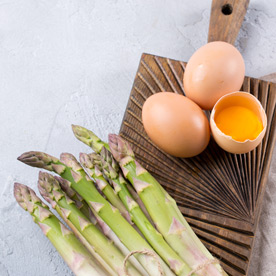
Despite the alarmist articles telling you otherwise, you have more control over your fertility than you think. While PCOS can cause complications with your hormones and reproductive system, there are steps you can take to increase your chances of conception.
Getting pregnant can be difficult whether you have PCOS or not. Feelings of frustration and impatience are common throughout the process. In this piece, we have collated together some natural remedies you can try in tandem with medical intervention, or as phase one of your pregnancy plan.
Diet

If you have PCOS, you may have been told there’s nothing you can do to improve your egg quality. This isn’t true. There’s plenty of research to suggest that even small improvements to your diet can increase the rate of success. Nutrition plays a big part in improving fertility. Small changes can make a big difference.
Complex carbs
Try to limit highly processed carbohydrates, and instead fill up on their more complex, a.k.a. ‘slower’, counterparts. These foods have a low glycaemic index. This means the rate at which your body breaks down the carb for energy is slower, and will subsequently have a gradual effect on your insulin and blood sugar levels. Research has shown that high insulin levels could disturb ovulation, so it is important to monitor your intake of carbs. Eating colourful fruits and vegetables is a good start and avoiding anything beige in high quantities.i ‘Good carbs’ include fruits, vegetables, whole grains, and beans.
Healthy fats
Trans fats, commonly found in snack foods, fast-food, animal products, and some margarine, are crammed with salt, sugar, and additives which can increase insulin resistance.ii Insulin drives glucose from the bloodstream to the cells, but resistance makes it harder for this biological function to happen. The pancreas continues to pump out more insulin regardless, which increases the amount of insulin in your bloodstream.
High levels of insulin can cause metabolic disturbances that negatively impact ovulation. Women with PCOS are already vulnerable to insulin resistance, so steering clear of foods with high amounts of trans fats is always advisable. As well as being bad for your waistline and skin, trans fats can disrupt your chances of conceiving. Avoid foods such as pies, french fries, cakes, doughnuts, and other deep fried foods when possible. That said, you don’t have to scrap fat altogether. In fact, our bodies need the healthy unsaturated kind for it to function optimally, especially when you’re trying for a baby. Try to eat more fertility friendly fats like avocados, olive oil, coconut oil, nuts and seeds and oily fish.
Plant-based protein
If meat is organic and not highly processed then the body can be nourished by animal proteins. However, research suggests that plant-based protein can give you a helpful boost when it comes to conceiving. In one study, consuming 5% of total energy intake as plant-based protein rather than as animal protein was associated with a 50% lower risk of ovulatory infertility.iii These results are very positive and show that plant-based proteins may be worth a try. Beans, legumes, nuts, and seeds are all super sources -- try implementing them in meals and as tasty snacks.
Fruit and veggies
Piling your plate with fruit and veggies isn’t anything novel in the world of wellness or dieting. But when you’re trying for a baby, striving to eat your 5-a-day is even more important. These foods are rich in all kinds of fertility-boosting vitamins, such as zinc, vitamin C, vitamin E, and folate. Aim for 3-5 portions of vegetables per day. Brussels sprouts and beetroot are especially rich in conception-aiding antioxidants. Adding 2 servings of low-GI fruits, such as cherries, prunes, apples, pears, strawberries, and peaches will also nourish your body.
Fertility superfoods:
In addition to our nutritional guidelines above, try munching more of these fertility superfoods – all of which are crammed with goodness and nutrients:
-
Bananas
-
Citrus fruits
-
Brussels sprouts
-
Sunflower seeds
-
Almonds
-
Chicken
-
Tomatoes
-
Carrots
-
Dark chocolate
-
Garlic
-
Oysters
-
Eggs
-
Mackerel
-
Asparagus
Weight
Gaining and struggling to lose weight is a common side effect of PCOS. Besides causing an outpouring of physical and emotional implications, being overweight or obese can negatively affect your fertility too. Excess weight impacts the circulation of hormones, which can incite various problems with your reproductive system. In fact, obesity is thought to cause 25% of ovulatory infertility.iv The good news is that losing just 5-10% of body fat can significantly improve your chances of getting pregnant.v So, if you are trying for a baby, getting regular exercise and eating a balanced diet should be a top priority.
Lifestyle
Stress less
We’ve said it before, and we’ll say it again: stress is a modern-day epidemic. However, with the correct tools and application, you can learn to control it. Not only will your body and mind thank you, but it will also increase the likelihood of conception. A stressed mind equates to a stressed reproductive system. Physical exercise like running, brisk walking, swimming or dancing, is a great way to relieve stress. For something a little slower and more relaxing, you could try yoga, tai chi, and pilates. Coupled with meditation, mindfulness, visualization or deep breathing, you should see some improvements in your stress levels. Take a look at our guide to mindfulness and PCOS for more techniques.
Avoid alcohol
It’s pretty obvious advice, but alcohol is best avoided if you’re trying to conceive. Not only are frequent drinkers more likely to experience menstrual problems, including amenorrhoea, dysmenorrhoea, and irregular periods, but they are also more prone to have early miscarriages and stillbirths.vi Alcohol even in small quantities can increase the amount of free radicals whirring round you body, which is not great for ovulation and egg quality.
It is often thought that one or two drinks are safe for women to drink when they’re trying to conceive. Although, recent investigations into this claim have found that even moderate drinking (five or fewer drinks) can negatively impact fertility.vii To give yourself the best chance possible, it is better to refrain from alcohol where possible, especially since PCOS can hinder your chances in other ways.
Cut out cigarettes
Like alcohol, cigarettes are not advised if you’re trying to conceive. Every time you smoke, toxic chemicals decrease blood flow, interfere with oestrogen production, and cause genetic abnormalities in eggs.viii In one study, data on smoking history was collected from 678 pregnant women. While 38 percent of non-smokers conceived in their first cycle, only 28 percent of smokers managed to achieve this.ix The findings from this study suggest that smokers were 3.4 times more likely to take over a year to conceive, compared to their smoking counterparts. All in all, smoking can delay conception and impact your fertility.
Supplements
Fish oil
Omega 3 is vital for hormone function and keeping your reproductive system in fighting-fit condition. What’s more, there’s evidence to suggest that essential fatty acids reduce inflammation. This is another symptom that is thought to affect fertility in women. Some researchers believe that inflammation may impact the production of progesterone and oestrogen.x
B complex
Many fertility experts believe the B vitamins are essential if you’re trying for a baby -- not just folic acid. They keep your hormone production in check. Furthermore, this family of nutrients is thought to help with the healthy development of the fertilised egg. Specifically, vitamin B6 is especially good at supporting the symptoms of PCOS.
Myo-inositol
Myo-inositol is a carbohydrate with a similar structure to glucose. Research has suggested that this vitamin-like substance may help with menstrual regularity, ovulation, and higher quality eggs when combined with the B vitamin folic acid.11
Final thoughts
Trying for a baby can be difficult at times, especially when PCOS is thrown into the mix. We want to reassure you that you have more control over your fertility than you might think. Fine-tuning your nutrition, lifestyle, and supplement programme can significantly increase the odds of conceiving. The bottom line is don’t give up.
Want to discover more ways to feel emotionally and physically empowered – ready to take on your PCOS? Feel free to browse the rest of our PCOS hub.
References:
-
Fica, S., Constantin, M. and Dobri, G. (2008). Insulin resistance and fertility in polycystic ovary syndrome. Journal of Medicine and Life. 1(4), 415–422..
-
De Souza, R.J., et al. (2015). Intake of saturated and trans unsaturated fatty acids and risk of all cause mortality, cardiovascular disease, and type 2 diabetes: systematic review and meta-analysis of observational studies. The BMJ. 351.
-
Chavarro, J.E., Rich-Edwards, J.W., Rosner, B.A. and Willett, W.C.(2008). Protein intake and ovulatory infertility. American Journal of Obstetrics and Gynecology. 198 (2), 210.e1–210.e7.
-
Clark, A.M., et al. (1995). Weight loss results in significant improvement in pregnancy and ovulation rates in anovulatory obese women. Hum Reprod. 10(10): 2705-12.
-
Position of the American Dietetic Association and American Society for Nutrition. Obesity, reproduction and pregnancy outcomes. (2009). J Am Diet Assoc. 109: 918-927.
-
Gude, D. (2012). Alcohol and fertility. Journal of Human Reproductive Sciences. 5(2), 226–228.
-
Jensen, T.K., et al. (1998). Does moderate alcohol consumption affect fertility? Follow up study among couples planning first pregnancy. BMJ: British Medical Journal. 317(7157), 505–510.
-
Melo, M.A., Soares, S.R. (2008). Cigarette smoking and reproductive function. Curr Opin Obstet Gynecol. 20(3): 281-91.
-
Baird, D.D., et al. (1985). Cigarette Smoking Associated With Delayed Conception. Jama Network. 253(20): 2979-2983.
-
Lessey, B.A. and Young, S.L. (2014). Homeostasis Imbalance in the Endometrium of Women with Implantation Defects: The Role of Estrogen and Progesterone. Semin Reprod Med. 32(05): 365-375.
-
Gerli, S., et al. (2007). Randomized, double-blind placebo-controlled trial: Effects of Myo-inositol on Ovarian Function and Metabolic Factors in Women with PCOS. Eur Rev Med Pharmacol Sci. 11 (5): 347-54.
Related Posts?
Disclaimer: The information presented by Nature's Best is for informational purposes only. It is based on scientific studies (human, animal, or in vitro), clinical experience, or traditional usage as cited in each article. The results reported may not necessarily occur in all individuals. Self-treatment is not recommended for life-threatening conditions that require medical treatment under a doctor's care. For many of the conditions discussed, treatment with prescription or over the counter medication is also available. Consult your doctor, practitioner, and/or pharmacist for any health problem and before using any supplements or before making any changes in prescribed medications.

Olivia
Olivia Salter has always been an avid health nut. After graduating from the University of Bristol, she began working for a nutritional consultancy where she discovered her passion for all things wellness-related. There, she executed much of the company’s content marketing strategy and found her niche in health writing, publishing articles in Women’s Health, Mind Body Green, Thrive and Psychologies.
View More



